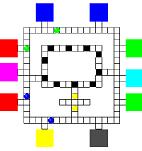Digital microfluidic systems (DMFS) are an emerging class of lab-on-a-chip systems for biochemical analysis. A DMFS usually consists of a planar array of electrodes and uses electrowetting to manipulate discrete droplets on the array. The chemical analysis is performed by repeatedly moving, mixing, and splitting droplets on the electrodes. We present an algorithm for coordinating droplet movement in batch mode operations on ring layouts with bus-phase addressing.
In bus-phase systems, each electrode is not individually addressable, instead a set of electrodes are all controlled by the same signal. The algorithm allows multiple independent reactions, each with two reactants and one product, to take place simultaneously on the chip. Chain reactions with multiple stages, where each stage produces reactants for the next stage, can also be handled by the algorithm. Sensor constraints under which droplets need to visit sensor locations for specified amounts of time are also addressed. We present simulation results using our algorithm to coordinate droplet movements for example analyses on a ring layout.
In all the animations listed below, droplets having the same colour form a compatible pair (i.e., droplets that are to react with each other). The mixing time is 5 clock cycles for all reactions. One of the droplets from each split operation is treated as waste and is sent to the waste outlet.
- Animation showing three independent reactions occuring parallely on a ring layout.
- Animation showing a chain reaction with seven stages; a stage is defined with each reaction (the structure of the chain is given as an input). Each stage produces a reactant for the next stage. There are no sensor constraints and the analysis takes 460 clock cycles to reach completion.
- Animation showing a chain reaction with seven stages; no stages have been defined with the reactions. There are no sensor constraints and the analysis takes 513 clock cycles to reach completion.
- Animation showing a chain reaction with seven stages and sensor constraints. A stage is given as an input with each reaction.


